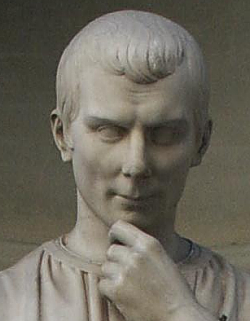In many cases, the ideas that support the systems of the day have a monopoly on the minds of the people, and have a physical manifestation in the mass of humans that believe them. The ideas serve as a channel that directs a river of meat toward various ends. Where ideas and their associated systems hold a monopoly, the lack of competing ideas means that a failure of the dominant system brings total collapse rather than a quick transition to a new way of life.
 |
| Machiavelli |
The title of these three posts includes the word "colonialism"--which implies these ideas are imposed. That is, a person or group develops the ideas and imposes them to achieve a goal. It's easy to confer an almost god-like status on those who succeed at creating these ideas and systems, or at least set them apart from all other men by assuming that what they imposed was born from perfect clarity of thought and purpose, and that the thing they created matched their concept.
In more mundane terms, having "left the city", and creating a new thought, they returned to conquer by teaching (or violently imposing) their new ideas. While the impulse of the creator is toward freedom--a need to leave the city to simply think, invariably the manifestation of their idea is the gray sleepiness of the systems of the city, and their own reanimation as an undead, which is at the very least, an ironic fate.
However, this description of the thinker and society might be more of a myth than a reality. The role of understanding or consciousness in shaping systems and society might be less important than nature and the nature of human beings. That is, the mass action of people, and the shape of societies and systems is maybe an emergent property, where simple rules combine to create complex systems.
One example of this is the tendency of capitalist corporations to grow bigger and bigger through acquisitions or monopoly practices that destroy competition. One can view this as the result of ideas. There are historical examples where collusion and scheming resulted in systems that are favorable for monopolies to flourish. However, there are analogies to this in nature, specifically, where larger animals require proportionally less energy per pound than smaller ones. That is the metabolic energy is proportional to the mass of the animal to the 3/4 power, so an elephant takes less energy per pound than a mouse, so there is an underlying mathematical principle that tends to drive this outcome.
Perhaps the mixture of these two concepts provides a more genuine description of the true relationship of thought and the systems that people inhabit than one or the other alone.
No comments:
Post a Comment
Please, no spam, or requests to post links, or business promotion in the comments. If I like your site, I'll put a link to it on my blog.